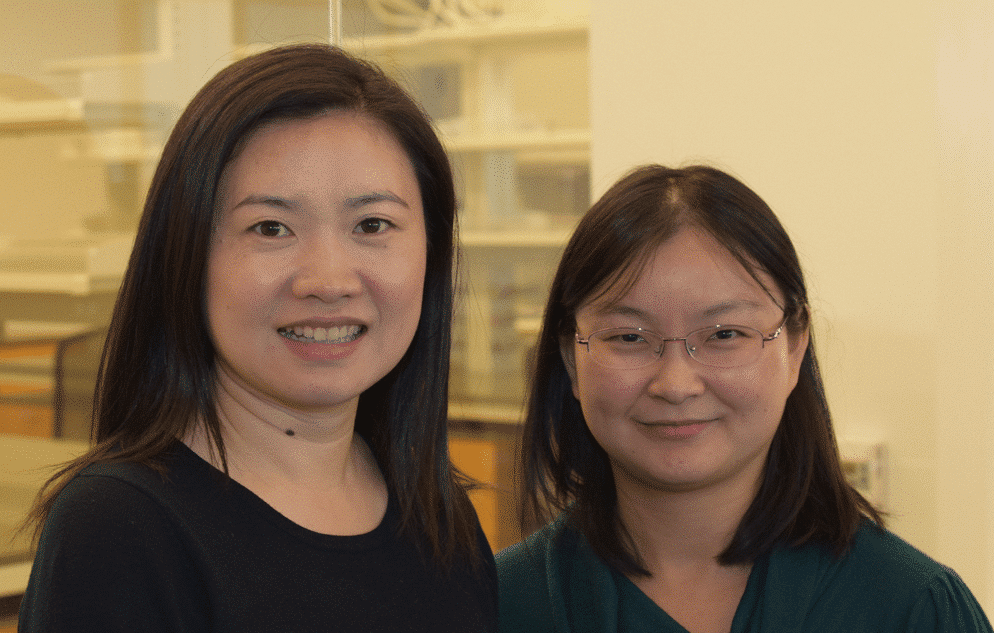Posted on November 15, 2016 in ASRC News, Neuroscience Initiative
The Neuroscience Initiative at CUNY Advanced Science Research Center is proud to announce the hiring of Jia Liu, PhD and Ye He, PhD, who will be managing the Epigenetic and Behavioral Facility and the Live Imaging and Bioenergetics Facilities, respectively, which aim to bring cutting-edge technology to the ASRC to serve the greater Neuroscience Community at CUNY.

Initiative Director Patrizia Casaccia noted these two new research faculty members are part of the vision of the Neuroscience program to stimulate interdisciplinary collaboration within the ASRC, while embracing an important role in community outreach.
“I am very pleased to welcome Jia and Ye to the ASRC Neuroscience Initiative, as they will provide the expertise and experience to adopt cutting-edge technologies to the investigation of questions of high relevance to human brain health and behavior,” Casaccia said. “I have the highest regard for these young talented scientists and I believe that they are fully committed to the ASRC mission of creating a highly collaborative interdisciplinary research institution.
“By combining their research experience with innovative technology and established partnerships, they will be able to contribute to the investigation of key mechanisms of basic brain function and dysfunction. The goal is to provide an integrated platform at the interface between environmental variables and cellular and molecular systems to interrogate the neuro-glial functional unit.”
Liu joins the ASRC from the Icahn School of Medicine at Mount Sinai, where she was Research Assistant Professor of Neuroscience, with a main interest in epigenetic modulation of behavioral disorders. As manager of the Epigenetics Facility, she will facilitate researchers who are interested in defining cell-specific epigenetic changes and their effect on gene expression. Understanding how genes can be expressed or repressed in response to external stimuli or exposure to environmental variables will help elucidate basic mechanisms of cell development and function. It will also lead to greater understanding of how malfunction of these regulatory mechanisms may contribute to the development of pathologies of the central nervous system including cancer, cognitive, autoimmune, psychiatric and neurodegenerative diseases.
“The Epigenetics Facility will have a broad impact not only for the neuroscience researchers at the ASRC, and CUNY, but also to the broader glial biology community within the New York City area,” Liu said. “The cutting-edge instrumentation will allow researchers to expand the scope of their research down to single cell level and even into areas they may not have been able to previously explore. It is a very exciting opportunity for me to oversee this facility and be a part of this research group from start.”
Since Liu’s research interests are at the intersection between epigenetics and behavior, she will also oversee the Mouse Behavioral Analysis Suite.. The suite will provide access to a wide array of behavioral testing and phenotypic characterization of mice in response to environmental triggers, fecal microbiota transplant and pharmacological treatment.
“The combination of animal behavioral analysis with the Epigenetics Core Facilities will allow researchers to expand their study from single molecule to animal behavioral,” Liu said. “This will promote a better understanding of the mechanisms of disease development, while providing deeper insight for the development of novel therapeutic targets.”
Liu earned her PhD in Neuroscience from Wesleyan University, while earning her BS in Biology from Sun Yat-Sen University in Guangzhou, China. At the ASRC, Liu’s research focus will be centered on the environmental impact—through neural-glia interplay—on psychiatric disorders. Through her work, she has demonstrated that impaired myelination and transcriptional response precede and accompany the behavioral consequences of stress-induced depressive behavior. Liu’s work has been published in Nature Neuroscience and Journal of Neuroscience
Ye He joins the ASRC from the University of California, San Francisco’s Department of Physiology, where she was an HHMI Research Associate working with Yuh Nung Jan. Her research interests span the interface between Neuroscience and Cell Biology, as she focused on characterizing the function of ion channels activated by gentle touch mechano-sensation and brain tumors, employing two photon microscopy in live animals and 3D imaging. He’s studies were published in Nature and Nature Neuroscience.
He received her PhD in Molecular Genetics, Microbiology & Immunology from the University of Medicine & Dentistry of New Jersey and Rutgers the State University of New Jersey, Piscataway. She earned her BS in Biochemistry from Nankai University in Tianjin, China. As manager of the Live Imaging and Bioenergetic Facility, she will work with researchers to study dynamic changes at the cellular level in living cells and in intact organisms through two photon microscopy, Airyscan confocal microscopy and other 3D imaging techniques.
“I am very pleased to be joining the ASRC and the Neuroscience Initiative at the early stages of development and especially for the opportunity to contribute building the Live Imaging and Bioenergetics Facility,” Ye He said. “Together with the other imaging resources hosted in the building, including the fMRI and Cryo-EM and the creation of Photonics, we believe that we can provide services that will favor interdisciplinary cross-fertilization within the ASRC, while enhancing the research possibilities for the neuroscience community at the multiple CUNY colleges. This is truly an exciting opportunity.”
